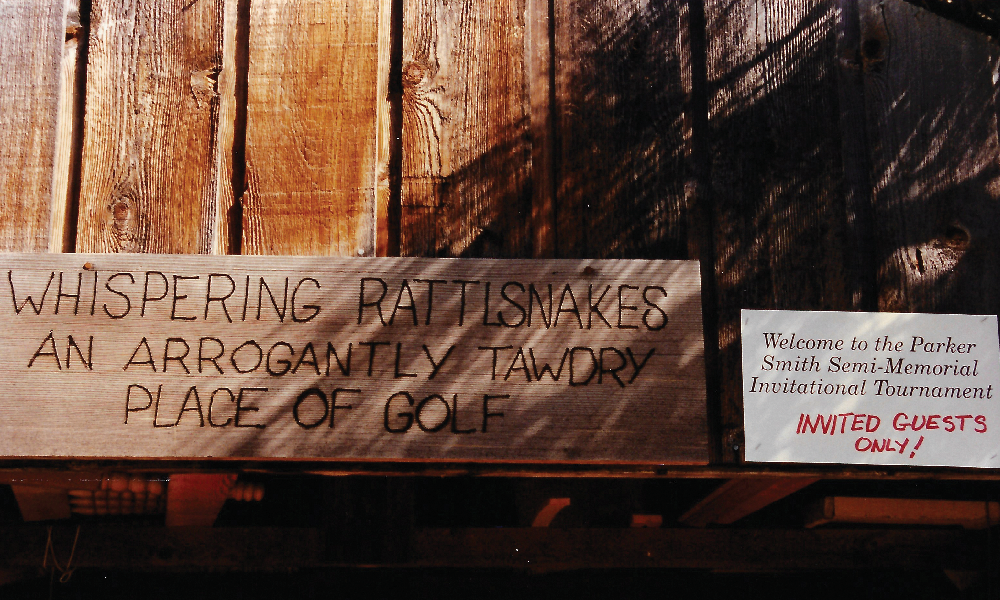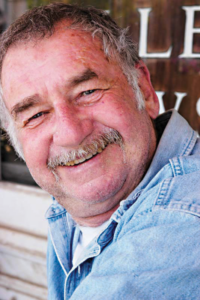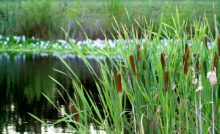Making the Rounds: Part 8


Bob Spiwak Signs
This column features the author’s recollections of his 33 years as a golf writer. These installments stem from his many travels and experiences, which led to a gradual understanding that the game has many intriguing components, especially its people.
In the second installment of this column, I wrote about some of my favorite characters met while researching and writing about golf. Perhaps the biggest character (figuratively speaking) of them all was Bob Spiwak. Sadly, the long-time Northwest-based golf writer passed away January 18 at his home in Mazama, Wash., at age 85. Bob is survived by his wife, Gloria, daughters Vikki and Whitney, and son Scott.
Bob was also one of my best friends.
In addition to becoming a prolific writer about golf and abounding other matters, Bob was truly humorous, as evidenced by these lines in his bio: “I took up golf in 1953 as a respite from the rigors of selling bibles door-to-door in North Dakota. My most treasured golf antiquity was a nod I got from former President Gerald Ford at the 1990 Golf Summit.”
After moving West from his New Jersey birthplace – with a brief stop in the Flickertail State to sell bibles – Bob became a Snohomish County (Wash.) deputy sheriff. He later moved from the hustle and bustle of the Seattle area to rural north-central Washington. There, he followed his diverse muses, writing hundreds of witty stories and becoming a skilled photographer.
Scott Spiwak related to me that one of his Dad’s favorite stories was when Ernie Els yelled at him during the Fred Couples Invitational. As the media director of the two-day tournament held in the 1990s, I heard about this confrontation – which I blew off as “That’s Bob!” Among other duties, my job involved giving out press and photo credentials. Bob was the only media member to get both.
Bob raised Ernie’s ire by daring to walk into a fairway for a prime picture just as Els was about to hit. After getting yelled at, Bob ran underneath a tree, which of course was where Ernie’s drive landed. When Els approached, Bob apologized. “Oh, it wasn’t you,” Els said graciously, “But you certainly were no help.”
It’s not surprising that the then-young South African would have a short fuse as, the day before the Couples’ event, he was embroiled in the final round of the 1995 PGA Championship at Riviera (where the ragged putting surfaces were infamously painted green). The third-round leader, Els finished two strokes behind champion Steve Elkington of Australia. Both players boarded a charter flight to Seattle on Sunday night for Freddie’s party, with “Elk” admittedly very hungover.
Bob was published so many times that, if the family endeavors to wade through his work, it’ll have quite the task. Among his expansive portfolio were pieces for two of my books, The Northwest Golfer’s Almanac (“A Refresher Course on Golf Etiquette”) and Golf Courses of the Pacific Northwest – 3rd Edition (“The Charms of North-Central Washington”).
He was a contributing editor at Cybergolf.com, and penned pieces and took photos for Back Nine, Pacific Northwest Golfer as well as many national magazines, including Golf Course News and Golfweek. Bob also published the Goat Wall Street Journal, a satiric spoof named after a crag near his 4-plus-acre homestead. For decades, he penned Off the Wall articles and columns for the local Methow Valley News and Methow Grist.
Bob had a true flair for turning a phrase. Here’s what he once wrote for Cybergolf: “Conditioning is important to play golf. For example, I take my putter into the bathtub and practice putting the ball on fast greens. I was very good about having the ball end on the drain hole, even with my wife shouting at me to take off my spikes. Right on my backswing, she did that, can you imagine?”
Here’s an excerpt for a story entitled “People You Might Not to Play with Again”: “Homer carefully sets his ball down 5 inches from the cup and picks up his marker. He looks at it, waiting for [playing partner] Paul’s admiring comments. Paul doesn’t even notice, so Homer tells him it is an authentic ball marker from St. Andrews. Paul notices a black dot atop Homer’s ball. Figures it’s his mark. But then he sees a red ‘H’ on the side. Before he can ask about the dot, Homer announces that he has this device that gives you the true point of balance of the ball. Very important in putting, he says, before jerking the tap-in to the left.”
Besides being a golf writer and photographer, Bob was an avid canoeist. After arriving at Diablo Lake in the Cascade Mountains for a cruise, he opened the car’s trunk and found he’d forgotten sunblock. But next to the spare tire was an “el-cheapo” umbrella with a GOLF magazine logo. So, he paddled with one hand and held the glare-protecting brolly over his head in the other. It was a calm day. But on his return to the launch site, the wind picked up.
Tacking uncontrollably at first, Bob soon figured out how to position the umbrella and use the wind to his advantage. The canoe quickly swept across the lake. Unfortunately, Bob had to hold the “sail” in front of his face, impairing visibility. While approaching a Highway 20 causeway he noticed people taking photos of him. Bob takes the story from here:
“As I skimmed under the highway, with ‘GOLF’ leading the way, I waved at the onlookers, many of who returned it, like a golf gallery at a large water hazard. It was so much fun I went on past the launch. On my port side (that’s nautical talk) came a small boat with an elderly man and two small children. The boat had an electric outboard and we were like ‘ships passing in the day.’ He hailed me with, ‘I’ll trade you the kids for your rig.’ We laughed and proceeded in opposite directions with the wave familiar to us sea captains.
“My big error was relaxing and letting the increasing wind take me to the shallows at the south end of the lake. Returning the half-mile or so to the launch, I found it had become quite a blow, and paddling against it, umbrella now reefed (that is nautical talk, too), the journey took longer and was a whole lot harder than the jaunt with the wind.
“Being pretty well wiped out when I finally landed the canoe, I realized there was a lesson to be learned here. Carry both sunblock and an umbrella, whether hitting a golf ball or plying the water in an open boat.”
One night in 1995, over some liquid refreshments and a roaring campfire at his property, Bob and I – both regular members of the Golf Writers Association of America and disillusioned with its East Coast bias – co-founded the Northwest Golf Media Association, which in its prime had 125 members. Bob was truly surprised when he became the first recipient of our organization’s Local Legends award.
Bob’s love of golf is embodied in the nine-hole par-3 course he designed and built beside his house. Motorists along Highway 20 could see the golf flagsticks he’d planted among the trees. His ultra-private Whispering Rattlesnakes Golf & Flubbers Club was meticulously tended by Bob, who allowed playing by family and friends. Unsurprisingly, considering its proprietor, the course even had a whimsical subhead: “An arrogantly tawdry place for golf.”
The sporty track sported tiny Penncross bent-grass greens, minuscule bunkers, several water hazards, tree-impinging (and occasionally mown) “fairways,” holes ranging from 30 to 110 yards, and all manner of wildlife. One night before a tournament, my wife and I were sleeping in the “pro’s cottage,” a pickup camper. At about 3:00 a.m. we were awakened by ominous rustling and grunting outside. The following morning, we found evidence that a black bear had stopped by the course. Before play began, Bob put a sign into what the visitor had left behind that read: “Bear poop, free drop.”
There was a tiny clubhouse containing all manner of scorecards and golf-related knick-knacks. It was where Bob built golf clubs, often giving his handiwork away to anyone willing to try them. He also fashioned a memorable Rube Goldberg-esque ball washer. Measuring over 5 feet tall and stretching 10 feet wide, it was constructed of white PVC pipe. A golfer dropped his soiled sphere into a hole at the top, then listened intently as it rolled back and forth for 30 seconds or so before being deposited into a bucket of water.
The only things not small about the course were the ball washer and Bob’s outsized influence on everything about it. When Bob grew older and the golf turf became too onerous to maintain – including pushing around a hulking, walk-behind Toro greens mower – he let it go fallow, changing the name to Whispering Rattlesnakes Arboretum and Sculpture Garden.
The Spiwaks hosted several annual tournaments, whose proceeds variously benefited a Montessori school, the local library, and the Susan Komen Breast Cancer Foundation. Upwards of 60 people would participate in these, with a potluck and awards ceremony afterward hilariously emceed by Bob.
They also held an event called the “Parker Smith Semi-Memorial,” named after an editor of a national golf magazine Bob wrote for. Smith once fell off a second-floor balcony and landed on a concrete slab below, with Bob a witness. Smith survived the fall with only a broken arm. But Bob thought Parker was capable of doing it again and if so, he would simply scratch off the “Semi” and use the trophy for future tournaments. A fine player, Smith would fly out to the Methow Valley from his South Carolina home every year – accompanied by a different, beautiful girlfriend each time – to be sure to win his tournament.
At another tournament in June, a swarm of nasty yellowjackets became a problem. Bob’s home is located at over 2,000 feet elevation, and westbound Highway 20 – the famed North Cascades Highway – is closed due to snowpack as its Washington Pass is 5,477 above sea level. But when the sun comes out and melts the snow in this beautiful alpine region, the temperature rises and so do the emergence of various wildflowers and varmints. One year was rife with very hungry yellowjackets. The first day of the tournament saw participants dancing and waving their arms wildly as they futilely swatted at the wasps, which hungrily divebombed exposed human flesh like Japanese Zero fighter planes during World War II.
Upon hearing many complaints, Bob said, “Well, I have these new bee traps I’ll put up for the second round.” The trap, hung from a tree branch, consisting of a clear plastic sphere with a top orifice where beer was poured. Bob insisted the pests preferred the cheap stuff. The traps were very effective, as, by late afternoon, the tawny color of Miller beer had turned black with dead yellowjackets that got drunk and drowned.
We brought our then 16-year-old daughter to one of these tournaments. Bob had a soft spot for Erica (he photographed her wedding 10 years later for free). Even though she was far down the leaderboard, as the tournament chairman he made sure Erica won several prizes, including the top award: a putter with a severely twisted, garish green-and-yellow shaft.
The head pro at Whispering Rattlesnakes was Wiffi Smith, winner of the 1954 U.S. Girls Junior and 1956 British Ladies Amateur. After earning eight titles on the LPGA Tour, she retired due to injury and launched a new career as a highly regarded instructor for several pro players. Wiffi’s 18-hole score of 3-under-par 51 ensures she’s the perpetual course-record holder at the tricky Whispering Rattlesnakes G&FB.
Bob’s club had two founding members, Bob Elliott (of Bob and Ray comedy fame) and CBS News’ Charles Kuralt. When Spiwak explained the request in his letter postmarked Mazama, Wash., a tickled Elliott agreed to accept the honor. Kuralt initially thought Bob was a stalker, but eventually relented after receiving several of Bob’s sincere epistles.
Bob, I, and our respective families stayed close during our 30-plus years of friendship. Like soul brothers do. He always had a different pseudonym in his email closings to me, including “Booby Jones” and my favorite, “Bunkerputter Bob” (which stemmed from a real golf moment).
Bob Spiwak was one-of-a-kind, an American original. He will be sorely missed by all who knew and loved him. And there are many of us.
Jeff Shelley has written and published nine books as well as numerous articles for print and online media over the past 32 years. The Seattle resident is the co-founder of the Northwest Golf Media Association. He co-authored (with Michael Riste) “Championships & Friendships: The First 100 Years of the Pacific Northwest Golf Association.” In addition, he wrote three editions of the book, “Golf Courses of the Pacific Northwest.”
Read other in Jeff’s Series of Making the Rounds – https://www.golfcoursetrades.com/author/jshelley/
Recent Posts
Escondido Golf and Lake Club: A Texas Golfing Treasure that Sets the Standard for Course Maintenance
When you think of a top-tier golf course, several factors come to mind: a stunning…
GCSAA names Joshua Tapp director of environmental programs
Former EPA Region 7 acting deputy regional administrator will provide strategic direction for environmental initiatives…
Circling Raven Golf Club Set to Open April 4; Coeur d’Alene Casino Amenity Unveils New Programs, Enhancements
Coeur d’Alene Casino Resort Hotel will open Circling Raven Golf Club on April 4 (weather…
Noteefy Expands Luxury Island Resort Portfolio with Additions of Casa de Campo, Fairmont Southampton
Casa de Campo Resort & Villas in the Dominican Republic and the Fairmont Southampton in…
Cattails -The Pond’s Drama Queen
Cattails – you’ve seen them. Tall, fluffy, and taking over ponds like they own the…
Carolinas to Honor Pinehurst’s Farren
Pinehurst’s Bob Farren, CGCS will receive this year’s Distinguished Service Award from the Carolina Golf…



